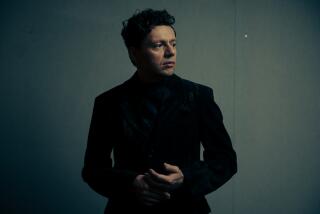SZABO TAKES MASK OFF ‘COLONEL REDL’
- Share via
On May 25, 1913, Col. Alfred Redl, commander of the 8th Army in Prague and head of the military intelligence unit, committed suicide. Ever since, the incident has been shrouded in scandal and mystery. It would seem that Redl had been blackmailed by the Russian military attache in Vienna, who had threatened to expose him as a homosexual if he did not turn traitor. But what truly were Redl’s motives in seeming to betray his country?
Istvan Szabo, Hungary’s pre-eminent director, and Klaus Maria Brandauer, Austria’s leading actor, were intrigued by this question and attracted to Redl as the subject of a film to follow their Oscar-winning “Mephisto,” a film a clef on the life of Gustav Grundgens, the gifted German actor-manager who flourished under Hitler’s rule. Just as Grundgens’ rise in the theater paralleled the ascent of the Third Reich, Redl’s fall coincided with the crumbling of the Austro-Hungarian Empire and the outbreak of World War I. If anything, in “Colonel Redl” (at the Cineplex, Beverly Center), Szabo and Brandauer evoke an even more complex man and era than in “Mephisto.”
“There were two or three things that attracted me to Redl,” said Szabo recently in his Sunset Strip hotel suite. A modest, gentle man of 47, with graying auburn hair and a passion for his work, he spoke virtually no English on previous trips to Hollywood but has now acquired an impressive mastery of the language.
“First, maybe because I’m a Middle European, I have been highly influenced by historical movements. It was the same for my father and grandfather: World War I, the economic crisis of the ‘20s, the Nazi movement of the ‘30s, and then World War II at the beginning of my life, and the cult of personality of the ‘50s. So I am attracted to stories about how the individual’s psychology is affected by such events. ‘Colonel Redl’ was a way of bringing character and history together.
“The second thing is maybe more important. I think everybody needs a feeling of security, of having a place in society, just like the body needs nourishment. I think all my films are all stories about people caught up in a daily struggle for this sense of security. I think Redl was a man who had many complexes of inferiority. Life was more difficult for him than for Hofgen (the name Grundgens was given in “Mephisto”). Hofgen loved himself, he thought he was very talented, but Redl faced a daily struggle to be accepted. He doesn’t love himself, he feels his background is not good enough to be a success. He’s talented, but because he doesn’t love himself he wears a mask--the uniform.
“Behind this mask is another person, a person who has a crisis of identity, which is one of the most dangerous psychological illnesses of our time. People try to change families, professions, countries and religions, even their appearance by plastic surgery, in order to be accepted.
“Now Redl wants to be somebody. In the Austro-Hungarian Empire this means he wants to be an aristocrat, but you can’t change your identity without betraying everything--your friends and family, yourself. It’s a direct way to suicide. I don’t know if my film is good or not--it’s not my profession to judge--but my message is important to me. I want to help a little mental hygiene.
“The third thing is that I wanted to make something with Klaus, and I thought Redl would be good for him too. Redl was very difficult for Klaus, for he is an actor who likes the spotlight, movement and shouting. That’s why ‘Mephisto’ was so good: He is that actor! But Klaus was paralyzed by the uniform. He would say, ‘What are you doing with me? You kill me! I can’t play in the uniform!’ I would say ‘You’re very angry with me, and this feeling comes out in your eyes, and this is good enough for me.’ I said to Klaus that his charisma comes out, but it was very difficult for him.”
“Istvan and I argued a lot,” admitted the gregarious, expansive Brandauer over a quick drink a few days earlier. “I said, ‘You and Koltai (cinematographer Lajos Koltai) can express your whole talent, your whole feeling, and I am asked to reduce mine! But to be so limited was a good experience for me as an actor.”
Szabo and Brandauer concurred that their Redl should emerge as a complex, ambiguous man and that a simplistic homosexual/traitor equation should be avoided at all costs. The Redl that evolved from their imaginations (and from what little research was possible) is a man who has been taught from childhood to worship Emperor Franz Josef, whose benevolence allowed this poor son of a railway man to attend the monarchy’s military academy. Ironically, it is this blind devotion to the increasingly senile emperor and to a treacherous Archduke Ferdinand and the crumbling empire that ultimately undoes their Redl. “For me, Alfred Redl found his identity and achieved his freedom only at the moment of his suicide,” Brandauer said.
Just as the military covered up the full circumstances of Redl’s suicide, Redl’s family changed its name in the wake of the scandal and Szabo was unable to locate any Redl relatives. Consequently, he was gratified to receive several months ago a brief note stating: “I am from Redl’s family. We were not allowed to speak of Alfred, the family was so ashamed. I’m very thankful you’ve shown him in a different light.”
More to Read
Only good movies
Get the Indie Focus newsletter, Mark Olsen's weekly guide to the world of cinema.
You may occasionally receive promotional content from the Los Angeles Times.










